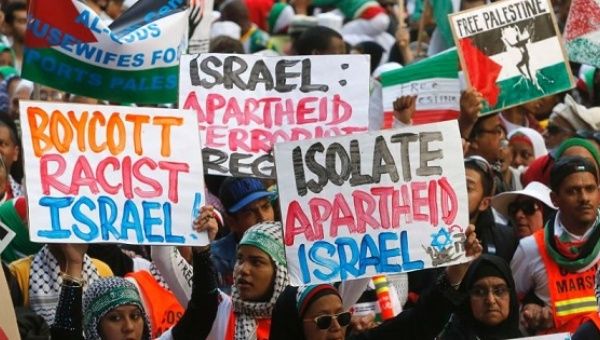Op-Ed By Elysia Martin
The Boycott, Divestment, and Sanctions (BDS) movement masks its true motives behind the slogan, “Freedom, Justice, Equality,” and instead demonizes the state of Israel by spreading propaganda that is not only hurting Israel but the Palestinians–the very people whose oppression they claim to want to end.
The BDS movement contradicts itself in theory and in practice. Its website reads: “BDS is an inclusive, anti-racist human rights movement that is opposed on principle to all forms of discrimination, including anti-semitism and Islamophobia.” BDS claims to promote human rights and that it is opposed to anti-semitism. However, its supporters not only contradict their own mission statement but are very open about the movement’s real intentions.
For example, As’ad Abukhalil, a professor at California State University, Stanislaus, said, “The real aim of BDS is to bring down the state of Israel….That should be stated as an unambiguous goal…Justice and freedom for the Palestinians are incompatible with the existence of the state of Israel.” BDS activist Michael Warschawski similarly stated, “Peace-or better yet, justice–cannot be achieved without a total decolonization (one can say de-Zionization) of the Israeli state.” John Spritzler, a pro-BDS author, said: “BDS’s stated goals (ending the Occupation, equality for non-Jews and Jews, and the right of return of the Palestinian refugees) logically imply the end of Israel as a Jewish state…”
These quotes illustrate the racial anti-semitism that BDS is promoting, as well as the belief that Zionism is just an extension of European colonialism. If BDS were only criticizing Israeli government policies, and advocating for peace through negotiation instead of delegitimization, there would be no problem. However, in singling out Israel based on the fact that it is a Jewish state, BDS is contradicting its own mission statement and actually promoting anti-semitism.
Since Zionism is a movement advocating for the empowerment of the Jewish people through self-determination and autonomy, and the modern State of Israel is the product of such self-determination. Not every Jew is a Zionist and not every Zionist is a Jew, but anti-semitism can easily be masked as anti-zionism. Natan Sharansky, an Israeli politician and former Russian refusenik, notes that the “‘new anti-Semitism’ is aimed at the Jewish state,” which can easily be hidden behind “legitimate criticism of Israel.” Thus, the claim that “BDS is an inclusive, anti-racist human rights movement that is opposed on principle to all forms of discrimination, including anti-semitism and Islamophobia” is false. One might assume from the BDS website that the movement is doing positive work by advocating for human rights on behalf of those oppressed; however, BDS is actually doing the opposite, by launching political and economic warfare against Israel through its divestment tactics and boycotts.
Indeed, BDS tactics also hurt Palestinian lives. While BDS activists boycott Jewish-owned businesses in the West Bank, they are also boycotting the livelihood of those Palestinians employed at these businesses. The most famous case is that of the Israeli beverage company SodaStream, which previously had a plant at the West Bank industrial zone of Mishor Adumim and employed 1,300 workers, including 350 Israeli Jews, 450 Israeli Arabs and 500 Palestinians from the West Bank. Due to BDS pressure, in October 2015, SodaStream was forced relocate the plant to Israel’s Negev Desert, forcing it to layoff the majority of its Palestinian workers. Despite the obvious loss, this caused to the Palestinian employees at SodaStream, BDS activists called the move a victory. The company was forced to layoff the last 74 Palestinians working in the plant in February of 2016 after a permit dispute with the Israeli government.
BDS’s argument that Israel should be blamed for the oppression of the Palestinians is a fallacy. It is the Palestinian Authority (PA) that is oppressing its own people by doing virtually nothing to build the Palestinian infrastructure and economy. It is creating a society where violence and terror are celebrated. In fact, the PA uses most of its foreign aid for weaponry, launching terror attacks against Israel, paying stipends to families of terrorists, and encouraging terrorism. In fact, a recent poll found that nearly all Palestinians – 95.5% – believe the government of PA President Mahmoud Abbas is corrupt, according to the Associated Press, with many perceiving Abbas and his aids as “elitist.”
If the BDS movement actually wanted to help the Palestinians as they claim, it would have to recognize that the Palestinian leadership is to blame for many of the issues in the West Bank and Gaza. Then, BDS could use its voice to empower Palestinians instead of perpetuating their victimization. Lastly, BDS would have to change its name. Boycotting, divesting from, and sanctioning Israel has not accomplished anything except prolonging the conflict. It should be noted that pro-Israel does not necessarily mean anti-Palestinian empowerment; rather, it means that one acknowledges Israel’s right to exist, to defend its borders, and to govern itself as an autonomous, democratic state.
Every country has its flaws, and Israel is no exception, but the way in which the Israeli-Palestinian conflict must be addressed cannot be done through boycott, divestment, and sanctions. Delegitimizing one narrative in order to give legitimacy to the other is actually detrimental to both Israelis and Palestinians, as the effects of BDS activism have shown. Instead, those who truly want to see an end to the conflict should focus on empowering Palestinians who want to live in peace with Israel and equipping leaders who will be able to see all sides of the story.
Elysia Martin
 Elysia Martin is a student at American University pursuing a bachelor’s degree in Jewish Studies. She formerly interned in the photo archives of the U.S. Holocaust Museum in Washington, D.C., has worked as a campus intern for The David Project, and was a research associate at Endowment for Middle East Truth, a pro-Israel think tank, where her article “The Hidden Agenda of the BDS Movement” was published. Elysia received a grant in 2016 to conduct original research on Jewish converts to Christianity during the Holocaust and was also a part of the 2016 Bonhoeffer Fellowship class for Christians United for Israel. She is currently president of CUFI at AU. When she’s not watching Hallmark movies or talking about how much she loves Texas, she can be found perusing old archives around D.C.
Elysia Martin is a student at American University pursuing a bachelor’s degree in Jewish Studies. She formerly interned in the photo archives of the U.S. Holocaust Museum in Washington, D.C., has worked as a campus intern for The David Project, and was a research associate at Endowment for Middle East Truth, a pro-Israel think tank, where her article “The Hidden Agenda of the BDS Movement” was published. Elysia received a grant in 2016 to conduct original research on Jewish converts to Christianity during the Holocaust and was also a part of the 2016 Bonhoeffer Fellowship class for Christians United for Israel. She is currently president of CUFI at AU. When she’s not watching Hallmark movies or talking about how much she loves Texas, she can be found perusing old archives around D.C.
For any article inquiries, please contact Elysia Martin directly at the email provided: em0839a@student.american.edu.


